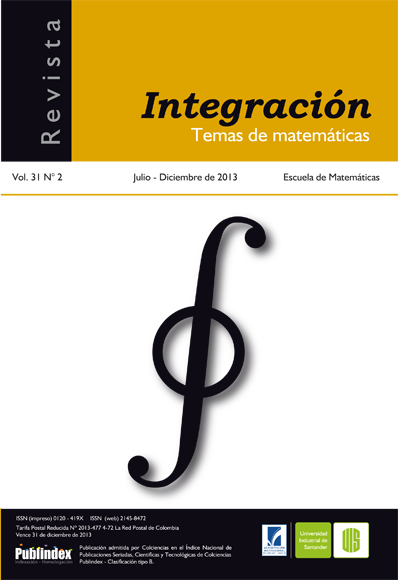Research and Innovation Articles
Published 2013-12-17
Keywords
- Binary codes,
- self-dual codes,
- doubly even codes,
- extremal codes and automorphisms of codes
How to Cite
Gutiérrez García, I., & Villar Salinas, D. (2013). On authomorphisms of extremal type II codes. Revista Integración, Temas De matemáticas, 31(2), 107–120. Retrieved from https://revistas.uis.edu.co/index.php/revistaintegracion/article/view/3750
Abstract
In this article we present some techniques to determine the types of automorphisms of extremal doubly even binary self-dual codes, also called extremal type II codes, with parameters [24, 12, 8], [48, 24, 12] and [120, 60, 24]. We aim to obtain information about the automorphism group considering the exclusion of some prime numbers from its order.
Downloads
Download data is not yet available.
References
- Assmus E. Jr., Mattson H. Jr., and Turyn R., “Research to develop the algebraic theory of codes”, Air force Cambridge Res. Lab., Bedford, MA, Report AFCRL-67-0365 (1967).
- Borello M., “The automorphism group of a self-dual [72, 36, 16] binary code does not contain elements of order 6”, IEEE Trans. Inform. Theory 58 (2012), no. 12, 7240–7245.
- Borello M. and Willems W., “Automorphism of order 2p in binary self-dual extremal codes of length a multiple of 24”, IEEE Trans. Inform. Theory 59 (2013), no. 6, 3378–3383.
- Borello M., Dalla Volta F. and Nebe G., “The automorphism group of a self-dual [72, 36, 16] code does not contain S3, A4 or D8”, arXiv:1303.4899
- Bouyuklieva S., De la Cruz J. and Willems W., “On the automorphism group of a binary self-dual [120, 60, 24] code”, Appl. Algebra Engrg. Comput. 24 (2013), no. 3-4, 201–214.
- Bouyuklieva S., O’Brien E. and Willems W., “The automorphism group of a binary selfdual doubly-even [72, 36, 16] code is solvable”, IEEE Trans. Inform. Theory 52 (2006), no. 2, 4244–4248.
- De la Cruz J. and Willems W., “On extremal self-dual codes of Length 96”, IEEE Trans. Inform. Theory 57 (2011), no. 10, 6820–6823.
- Dontcheva R., “On the doubly-even self-dual codes of length 96”, IEEE Trans. Inform. Theory 48 (2002), no. 7, 557–560.
- Gleason A.M., “Weight polynomials of self-dual codes and the MacWilliams identities”, 1970 Actes du Congrès International des Mathématiciens, vol 3 (1971), 211–215.
- Huffman W.C., “Automorphisms of codes with applications to extremal doubly even codes of length 48”, IEEE Trans. Inform. Theory 28 (1982), 511–521.
- Leon J.S, Masley J.M. and Pless V., “Duadic codes”, IEEE Trans. Inform. Theory 30 (1984), 709–714.
- MacWilliams F.J. and Sloane N.J.A., The theory of error-correcting codes, North-Holland, Mathematical Library Amsterdam, 1977.
- MacWilliams F., Odluzko A., Sloane N. and Ward H., “Self-dual codes over GF(4)”, Journal of Combinatorial Theory 25A (1978), 288–318.
- Mallows C., and Sloane N., “An upper bound for self-dual codes”, Information and Control 22 (1973), 188–200.
- O’Brien E. and Willems W., “On the automorphism group of a binary self-dual doubly even [72, 36, 16] code”, IEEE Trans. Inform. Theory 57 (2011), no. 7, 4445–4451.
- Rains E., “Shadow bounds for self-dual codes”, IEEE Trans. Inform. Theory 44 (1998), 134–139.
- Sloane N., “Is there a (72; 36) d = 16 self-dual code?”, IEEE Trans. Inform. Theory IT-19 (1973), no. 2, 251–251.
- Yorgov V.Y. and Huffman W.C., “A [72, 36, 16] doubly even code does not have an automorphism of order 11”, IEEE Trans. Inform. Theory 33 (1987), no. 5, 749–752.
- Zhang S., “On the nonexsitence of extremal self-dual codes”, Discrete Appl. Math. 91 (1999), no. 1-3, 277–286.
